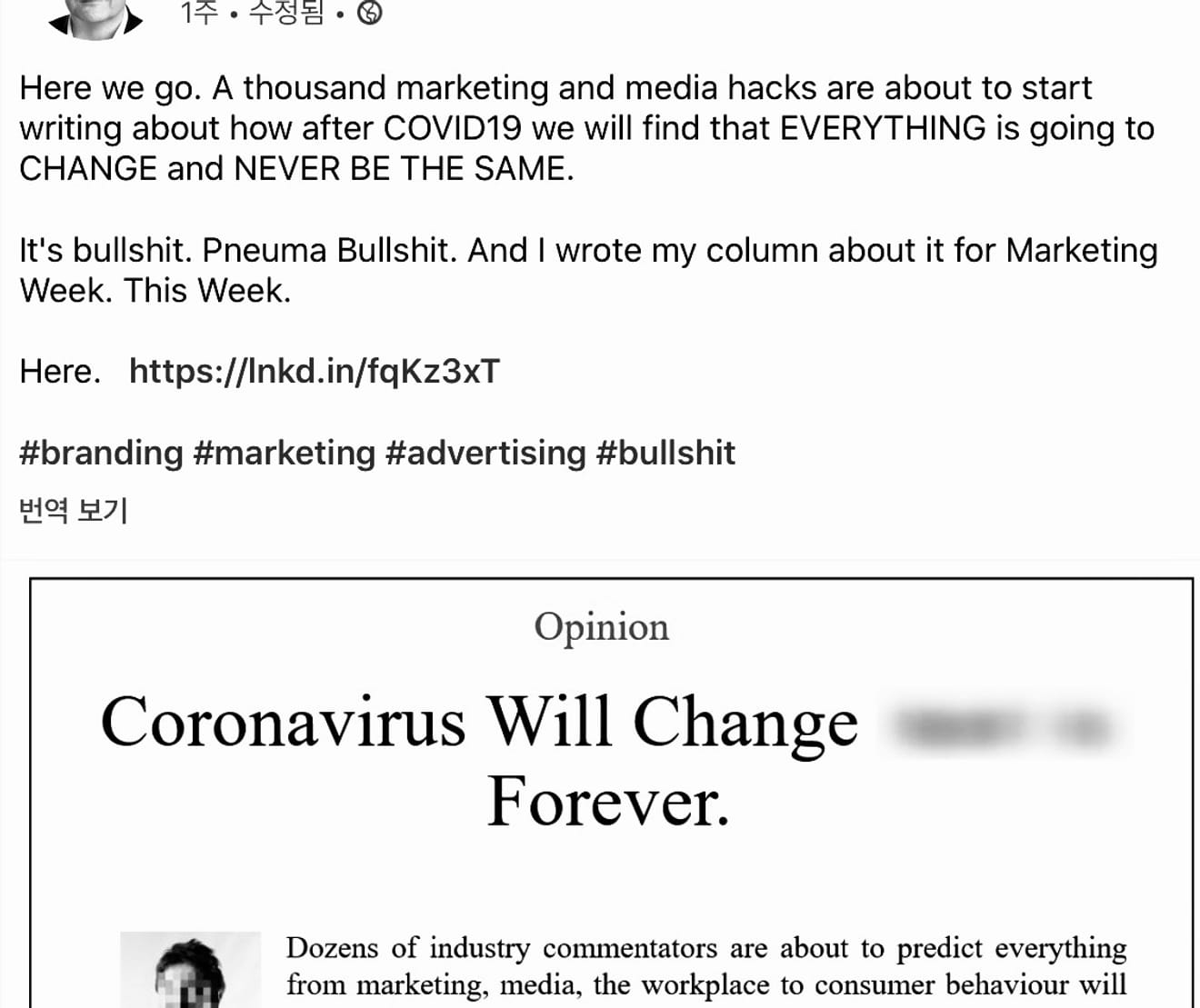Subject
- #Hygiene Management
- #Changes in Daily Life
- #Online Experience
- #Field Research
- #Prediction
Created: 2024-04-29
Created: 2024-04-29 15:18
Regarding the starting point for field research
These days, LinkedIn feeds are overflowing with posts related to 'predictions after the Corona crisis'.
And now, posts expressing anger and opposing these opinions that are becoming certain are also emerging.

As a business owner experiencing confusion, I also want to understand the context of the current situation and prepare for the future based on it. Very much so. However, because the daily lives of people who used to be the benchmark for observation are undergoing rapid changes, it seems very difficult to clearly define the scope of the subject and derive behavioral patterns. Right now, it's not much different from experiencing a war.
Despite that, I occasionally receive this question.
It's too early to answer this question due to the unclear situation and lack of information, so I'd like to at least present the following 3 questions that can help readers gain a sense of their own situations.
Instead of a finalized action plan, these are starting points to identify the direction, and appropriate questions for that purpose. If there are any of you who are struggling with the same concerns, it would be appropriate to express these as reference points that you can directly ask your core customers in your own business and discuss with them.
In social psychology, the 'violation experiment' is a familiar concept. It involves intentionally creating challenging and uncomfortable points within a familiar situation and context, which provides an opportunity to understand the essence of that experience.
The changes in daily life that have been forcibly created by the Corona virus recently (e.g., dual-income couples unable to send their children to daycare, customers who can no longer enjoy the experience of shopping in stores and physically touching products) provide an opportunity to understand the meaning of existing, familiar behavioral patterns. Also, the changes in behavior undertaken to replace these patterns can suggest hidden opportunities for businesses, such as the formation of new habits.
A sanitation worker complains on TV news about the excessive number of masks people are discarding on the streets. Considering that they are also someone's family, it's understandable that they would be uncomfortable picking up masks with the bodily fluids of unknown individuals. This phenomenon can be linked to the 'bringing it home, anxiety about something from outside' that the Corona virus has highlighted.
For instance, this could mean that businesses need to anticipate and prepare for heightened customer interest and scrutiny regarding the origin of their products, hygiene standards during the manufacturing process, and the logistics involved in delivery compared to the past.
Following online schooling, news reports have emerged about indiscriminate defamation of teachers and server crashes due to a sudden surge in users. The Corona virus has seemingly established a clear benchmark for public institutions and businesses regarding how far they need to adapt online, the criteria for investment decisions, and the ethical standards for interactions in the anonymous space of the internet. This also applies to discussions regarding the next steps in online medical consultations, which have been debated for over a decade in the medical field.
Furthermore, people attempting Instagram live broadcasts during frustrating periods of self-isolation and celebrating birthdays online with groups of people seem to be breaking down the existing boundaries related to the scope and meaning of communication. It's incredibly fascinating to consider how and to what extent this experience will continue in the future.

In summary, the scope of people's lives that needs to be researched and understood is incredibly vast. At least for me alone, the changes in people's daily lives that seem rapid but are unfolding slowly alongside the Corona virus are simply too enormous. It seems difficult to understand this confusion until projects are created, narrowing the scope based on the issues that a particular company is struggling with.
Moreover, it seems that daily life alongside Corona has already begun in South Korea. From now on, rather than being passively captivated by the predictions pouring in, it might be best to focus on creating opportunities to ask our ‘immediate customers’ about their current daily lives and solidify our relationships with them.
Comments0